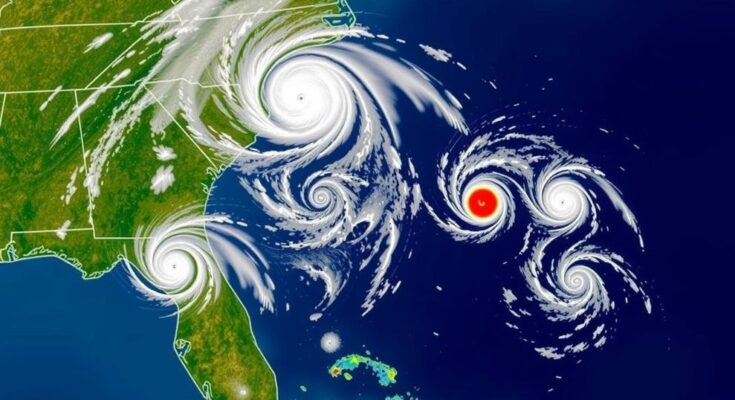The 2024 Atlantic hurricane season concluded with 11 hurricanes, surpassing the average of seven. Unusual warm ocean temperatures correlated with this intensity, leading to significant destruction and fatalities across the U.S. Hurricane Beryl became the earliest Category 4, while Helene caused extensive damages. Climate change implications are evident as the patterns of severe storms evolve.
The 2024 Atlantic hurricane season officially concluded on Saturday, ending a notably active period characterized by 11 hurricanes, surpassing the typical average of seven. This season was marked by severe impacts and fatalities far from landfall locations, particularly along the U.S. Gulf Coast. Meteorologists described the season as unusually intense, largely attributable to higher ocean temperatures, which significantly influence hurricane formation and intensity.
Eight hurricanes made landfall impacting regions including the United States, Bermuda, Cuba, the Dominican Republic, and Grenada. Notably, Hurricane Beryl emerged as the earliest recorded Category 4 hurricane in June, devastating Carriacou in Grenada and inflicting substantial damage in Jamaica, resulting in two fatalities. This event was significant, considering the rarity of such storms occurring in the early summer months. The storm further escalated to a record Category 5 by July 1, a deviation from expectations since major hurricanes typically develop later in the season.
September saw the catastrophic Hurricane Helene, which claimed over 200 lives and caused damages exceeding $48.8 billion in North Carolina alone. Its impact resonated through several other states including Florida and Virginia, affecting essential infrastructure such as drinking water systems and agriculture.
In October, Hurricane Milton attained wind speeds of 180 mph, making it one of the most formidable hurricanes recorded in the Gulf of Mexico, exceeded only by Hurricane Rita. The rains from both Helene and Milton inundated areas, leading to record precipitation levels in regions like Asheville and Tampa. In November, Hurricane Rafael approached historical significance with 120 mph winds, resulting in additional havoc in Cuba amidst recovery from the earlier Hurricane Oscar.
Experts attribute the unprecedented nature of this hurricane season primarily to climate change, which has accelerated ocean warming, thus allowing for hurricanes to develop intensively outside the expected patterns. As Brian McNoldy stated, “In other words, we never had a storm as strong as Beryl so early in the season anywhere in the Atlantic and we never had a storm as strong as Milton so late in the season in the Gulf of Mexico.” McNoldy further asserts that while climate change may not directly cause specific weather events, it increases the likelihood of extreme storms occurring.
The Atlantic hurricane season runs from June 1 through November 30 each year, during which meteorologists monitor atmospheric and oceanic conditions conducive to the formation of tropical storms and hurricanes. This season is critical as hurricanes pose significant threats to life, property, and the economy. Climate change has been recognized as a crucial factor that influences weather patterns, including the frequency and intensity of hurricanes, with warmer ocean temperatures facilitating the development of more severe storms earlier and later in the season than previously observed.
The closure of the 2024 Atlantic hurricane season highlights the increasing intensity and frequency of hurricanes, with a total of 11 storms confirming the trend attributed to climate change. Notable hurricanes such as Beryl, Helene, Milton, and Rafael demonstrated the profound impacts of warmer ocean temperatures on storm development and behavior. Moving forward, understanding these developments and the underlying climate factors remains paramount for disaster preparedness and mitigation strategies.
Original Source: www.arkansasonline.com




